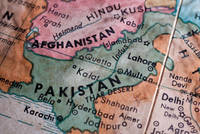The Challenge of a Pakistani Spring
This post was published on Global Policy Institute, London's website as a winner of students' voice in student think tank section on 17 August, 2011. A link to the original post is here.
Many Middle Eastern regimes have fallen due to the recent surge in youth-driven movements for rights and democracy. This change, the so called Arab Spring, is propagating on its own terms. A recent law passed in the Kingdom of Saudi Arabia for punishing those who criticize the regimepoints to restlessness in one of the most conservative states of the world. It is increasingly clear that no regime is now secure from public protests spurred on by recent events.
Pakistanis consider themselves to be very close to Middle East Arab nations, mainly due to their religious connection. In contrast to many Arab states, the Pakistani government has not been able to recognize Israel as a sovereign state due to the fear of public backlash. Such are the sentiments regarding Middle Eastern territorial disputes amongst the Pakistani public. Despite its democratic credentials, is it possible to determine the characteristics of a potential ‘Pakistani Spring’, understood as a popular uprising against the establishment?
Pakistan is a democratic country with an apparently free media and judiciary. These institutions have held power to account on many occasions. But the state of affairs for the general public has become virtually impossible to endure. Sugar was the first of the daily commodities to disappear from the markets, now followed by many other items. Prices are rapidly getting out of reach. Electricity is scarce. Villages, where almost two thirds of the population live, are virtually devoid of electricity for as long as 18-20 hours per day. Natural gas for vehicles is available 3-4 days in a week. People affected by last year’s devastating events are still recovering from their suffering and this year’s monsoon has already started. Higher education projects have come to a halt. Railways have run out of diesel. Pakistan International Airlines has been reporting deficits of billions of rupees every year. Three governors of the State Bank of Pakistan and three finance ministers have been appointed in the last three years. For four months, Pakistan was operating without a foreign minister. This has now changed and Hina Rabbani Khar, who has a diploma in hotel management, has been given control of the foreign ministry. Law and order is deteriorating to a very low level, with people being killed each and every day due to terrorism and gang wars. Pakistan’s ties with the United States of America are at their lowest point in the past decade. The US congress haswithheld part of its military aid to Pakistan as a penalty for a lack of cooperation, further straining both diplomatic relations and the financial state of the country. Pakistan recently scored 12th on a failed states scale around the world. Remember that this is a nuclear state with missile capability and a strong army, intelligence and an entrenched establishment.
If people were to stand up against this state of affairs, what would the popular movement look like? The sitting regime is too fragile in itself to resist any such movement were it to arise. Ever since the American forces’ direct operation in Abbotabad, the security establishment has come under severe criticism from the media. Already, the alliance with US NATO forces was very unpopular with the masses as the decision was taken by a dictator and no public institution was taken into confidence. The scenario becomes complicated here. Like the Middle East, Pakistan has its share of growing internet users. Social networking has started becoming meaningful to people’s daily lives. Blogs and tweets are the order of the day as journalists and politicians are getting in touch with public opinion through such forums. The same is true with right wing militant organizations. Conspiracy theories about the hidden agenda of western forces are being propagated widely. Pakistan has been under the influence of religious forces ever since its creation though the same clergy opposed its very creation in the beginning. Following the death of Muhammad Ali Jinnah, the founder of Pakistan, the Objectives Resolution was introduced that laid the foundation for a theocratic state constitution. Successive military regimes used right wing parties to prolong their respective rules which intensified fundamentalist ideas amongst the masses. Zia-ul-Haq’s introduction of discriminatory laws and fanning of extremism took this to a point of no return. Shariah is pronounced to be better than democracy. Many of the masses don’t hesitate to praise the Taliban and their system of governance, including their stance of the women’s education, rights and jihad.
So, if an Arab-like-spring happens in Pakistan and is hijacked by the extremist mindset, there will be no going back for Pakistan as well as the rest of the world. The combination of nuclear capability in a (nearly) failed state is a recipe for disaster. The replication of the Taliban’s model in Afghanistan, equipped with weapons of genocide is clearly unacceptable yet the spectre has arisen nonetheless. Potent attacks on Army headquarters in Rawalpindi and on the Navy’s PNS Mehran in Karachi have raised eyebrows. But is a popular uprising, led by a hardline Islamist agenda, inevitable? No, it is not.
In contrast to the Middle Eastern states, Pakistan is not a monarchy. It is a democracy, albeit a very weak one with a mighty security establishment. If economically stable, Pakistan can fight against all other menaces including terrorism. As the biggest donor to Pakistan, the USA can pressurize Pakistan to hold free and fair elections under international observers and an independent election commission. The USA, by looking beyond its short term goals, can help Pakistan elect its true representatives. Anti-American sentiments can be brought under control if they make their intentions less ambiguous and more fruitful for the people of Pakistan and not a bunch of handpicked obedient politicians.
Khalid Farooq is a PhD student at Université François Rabelais in Tours, France.




Thank you Mr Farooq, for a thought provoking overview of the current quagmire that Pakistani's face. I guess they are right when they say ; "Evil prevails in a society, when good men fail to act". I believe its us who has to change and not the system or the politicians as they are mere extensions of our immoral souls.We need not the Americans or the Arabs for their wealth or their democracy, what we need is to inbreed honesty,courage and morality. Work on these and the dream for a spring will become reality.
ReplyDeleteRegards,
MJ